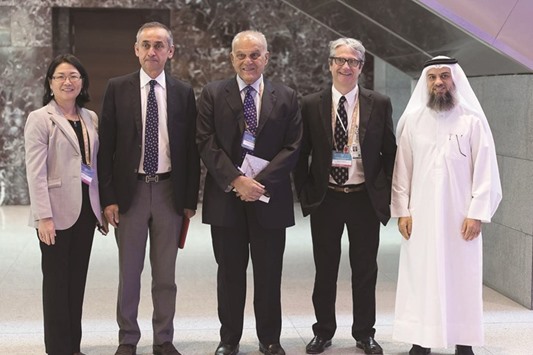Sidra Medical and Research Centre (Sidra) hosted Qatar’s first symposium on Functional Genomics recently with the participation of more than 350 people.
The symposium aimed at sharing knowledge on the latest research trends and programmes in functional genomics and genomics medicine.
The aim of functional genomics is to understand the complex relationships between genotype and phenotype on a global scale.
Sidra is preparing to implement functional genomic studies at advancing local and regional research capacities, with the ultimate goal of improving healthcare in Qatar.
Dr Ena Wang, Sidra’s research chief of Translational Medicine and chair of the Functional Genomics Symposium Organising Committee, said: “Understanding the genome is the key to building a road map for better health outcomes. Genomics research is an integral part of Sidra’s research strategy and it is our intention to host annual symposiums dedicated to genomics and beyond.”
“The Functional Genomics symposium this year was truly a unique opportunity to bring together the best minds and the best practices in genomic research and genome guided medicine–the possibilities of which will positively impact local and regional developments in genomic studies as well as advance personalised healthcare,” she said.Sidra’s vice chair of the Board of Governors and chair of the Executive Committee, Prof the Lord Darzi of Denham hosted the opening address.
He announced a key milestone with the Qatar Genome Project pilot study by stating that Sidra’s Clinical Genomic Lab and Omic core team will complete the first 1,000 whole genome sequences (WGS) by end of 2015.
The team aims to complete the pilot phase of 3,000 WGS by June 2016. The QGP pilot study will help create a comprehensive genome-wide catalogue of variants that are representative of the genetic diversity of the Qatari population.
This will pave the way for the first Qatar genome reference generation which will function as baseline for future disease focused studies and build the first draft of Qatari Reference Genomes.
Dr Asma Ali al-Thani, chair of the Qatar Genome Project Committee and vice chairperson of Qatar Biobank, said: “Over the past ten years, Qatar has seen a revolutionary improvement in the field of healthcare. Advancements in primary healthcare, health insurance and the establishment of the Qatar Genome Project is a continuation of our commitment and a step forward in achieving Qatar National Vision 2030. As the QGP embarks on its pilot phase, our goal is clear; position Qatar as the leader in personalised healthcare allowing for local and regional impact with global significance”.
Dr Francesco Marincola, Sidra’s chief research officer, summarised Sidra’s systematic approach in tackling human genomics research and its clinical implementation.
He outlined Sidra’s Immune Quest Project, as part of the functional mapping of the human
genome.

(From left) Dr Ena Wang, Lord Darzi, Sir Magdi Yacoub, Dr Francesco Marincola and Dr Ibrahim Janahi, HMC at the event.
